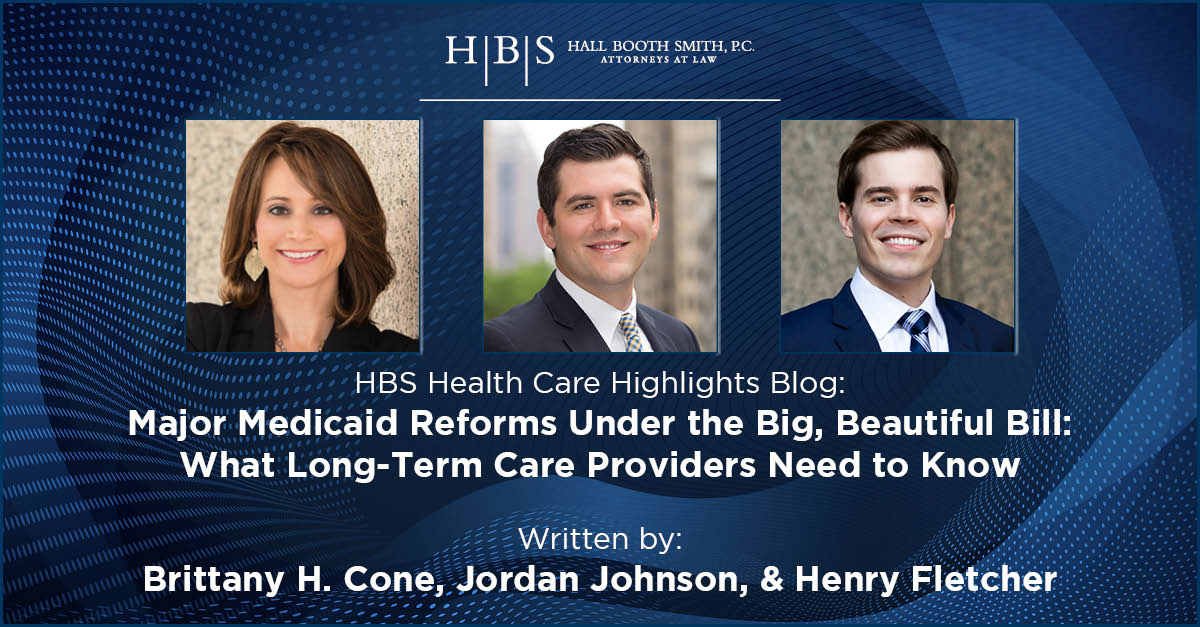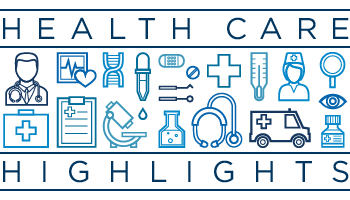
Major Medicaid Reforms Under the Big, Beautiful Bill: What Long-Term Care Providers Need to Know
Introduction
As part of the recently enacted H.R. 1, the One Big Beautiful Bill Act of 2025 (OBBBA), Congress has introduced several changes that impact Medicaid eligibility, funding, and provider operations, particularly for those serving the long-term care populations. While some provisions do not take effect until 2026 or later, proactive planning is essential to avoid disruptions to care and reimbursement.
Below, we highlight key provisions most relevant to LTC providers, including Medicaid reimbursement, and their implications:
Reduced Retroactive Coverage (Section 71112)—Effective January 1, 2027
Medicaid’s retroactive coverage window for non-expansion beneficiaries, such as nursing home residents, is being reduced from 90 to 60 days. As a result, providers risk going unpaid for services rendered if applications are not timely submitted.
In order to best prepare for this legislation, providers should establish stringent internal protocols for Medicaid application upon admission and, at a minimum, every 2 months thereafter. Additionally, providers should consider revising admission agreements to address payment responsibility for uncovered periods to ensure their interests are protected.
Uniform Home Equity Cap for LTC Eligibility (Section 71108)—Effective January 1, 2028
Medicaid applicants seeking long-term care services will soon face a home equity limit of $1 million, replacing the current state-specific thresholds for homeplace exclusions. States may no longer use asset disregard strategies to bypass this cap, with the exception of homes on agriculturally zoned property. As a result of this enaction, residents with higher-valued homes may no longer be eligible for Medicaid benefits due to excess resources.
In order to best prepare for this legislation, providers should implement strategies to identify residents whose home values approach the cap and work to explore compliant planning techniques before the effective date.
Six-Month Eligibility Redetermination (Section 71107)—Effective December 31, 2026
For Medicaid expansion adults, or those who qualify for Medicaid under the Affordable Care Act, eligibility redeterminations will shift from annual to every six months. Notably, this does not apply to the aged, blind, or disabled category of Medicaid recipients, which is the primary Medicaid type for nursing home residents.
While this change does not directly impact the usual nursing home Medicaid recipients, nursing home providers should be aware of this for those residents in receipt of such benefits, considering the potential income source and implications on securing aged, blind, or disabled Medicaid.
New Limits on Provider Taxes (Section 71115)—Effective July 4, 2025
Under the OBBBA, states are barred from implementing new provider taxes or increasing existing ones, regardless of whether via rate, amount, or taxable base. For Medicaid expansion states, the law introduces a phased reduction in the allowable provider tax cap, gradually decreasing it from 6% to 3.5% by fiscal year 2032. For non-expansion states, provider taxes are frozen at current rates and bases effective July 4, 2025, maintaining the current maximum safe harbor of 6%. Notably, while nursing homes and intermediate care facilities tax rates are frozen, they are exempt from these new limits as long as their tax rates remain at or below a 6% threshold.
For long-term care facilities, these changes may lead to a decline in supplemental Medicaid payments that are often funded through provider taxes. As a result, providers should evaluate the potential financial impacts that a lack of supplemental payments would have and prepare for changes in reimbursement strategies to account for financial uncertainty.
Staffing Standard Moratorium (Section 71111)—Through September 30, 2034
As a result of OBBBA, the Centers for Medicare and Medicaid Services (CMS) is barred from enforcing new LTC staffing mandates released in April 2024, unless portions were already in effect. Providers can now use this window to evaluate current staffing structures and plan for the eventual compliance with the proposed federal minimums.
If you need assistance preparing for the implementation of the above-mentioned requirements, please reach out to our Aging Services and Health Care teams.
Disclaimer
This material is provided for informational purposes only. It is not intended to constitute legal advice nor does it create a client-lawyer relationship between Hall Booth Smith, P.C. and any recipient. Recipients should consult with counsel before taking any actions based on the information contained within this material. This material may be considered attorney advertising in some jurisdictions. Prior results do not guarantee a similar outcome.
Blog Overview
About the Author
Brittany H. Cone
Partner | Atlanta Office
T: 404.586.6620
E: bcone@hallboothsmith.com
Brittany H. Cone focuses her practice on a wide range of regulatory, administrative, and litigation matters in health care. Certified in Health Care Compliance by the Health Care Compliance Association, she works with providers on the full spectrum of issues they face including Medicare, Medicaid, regulatory compliance, administrative hearings, and appeals.
Jordan Johnson
Partner | Atlanta Office
T: 404.586.6639
E: jjohnson@hallboothsmith.com
Jordan Johnson specializes in aging services and health care matters. His practice features a wide range of regulatory, administrative, and litigation matters, including the full spectrum of issues healthcare providers face such as reimbursement, regulatory compliance, and administrative hearings and appeals.
Henry Fletcher
Attorney at Law | Atlanta Office
T: 678.539.1611
E: hfletcher@hallboothsmith.com
Henry Fletcher is an associate in our Atlanta office, focusing his practice on health care and aging services matters.






Leave a comment
You must be logged in to post a comment.